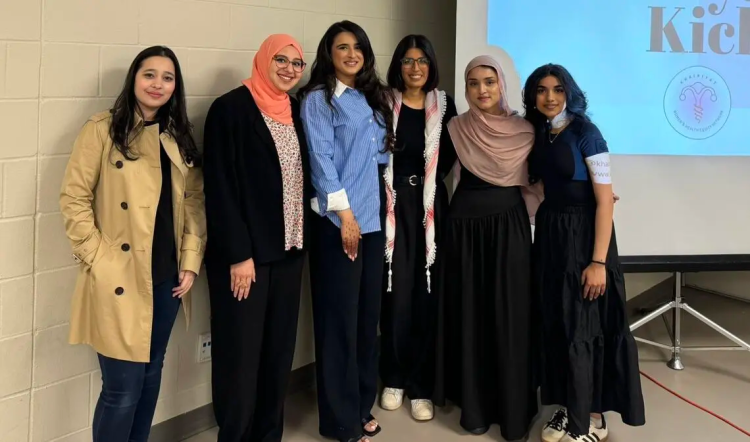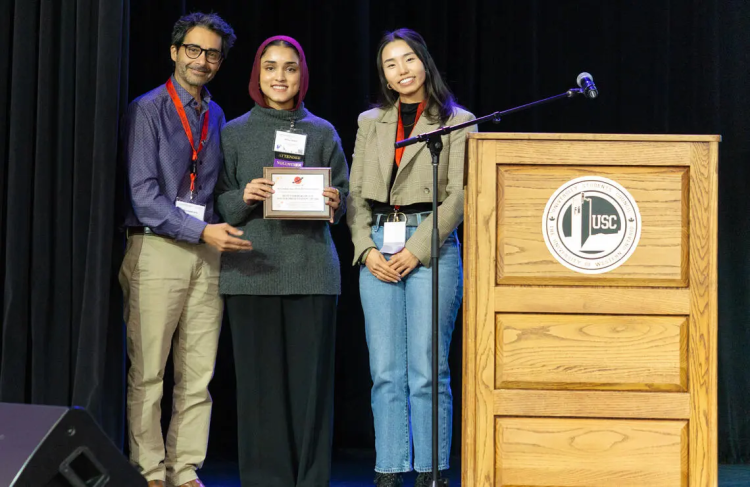When Shafaq Batool learned she had been named a Rhodes Scholar, her first thoughts were of her parents.
"Personally, it feels like a moment of validation for my parents and the sacrifices they made as first-generation immigrants from Kashmir," says Shafaq, a fourth-year Bachelor of Science honours psychology student in the Faculty of Arts at the University of Calgary.

Shafaq Batool, fourth-year psychology student named Rhodes Scholar. Photo Courtesy of Shafaq Batool
"They rebuilt their lives in Calgary so my siblings and I could have choices they never did; this scholarship is proof that their resilience did not go unnoticed."
Shafaq is one of 11 Canadians selected for the prestigious Rhodes Scholarship this year, which will take her to the University of Oxford in fall 2026. For her, this recognition is about more than personal achievement.
"This win is not just mine," she says. "It is for the young students who may not see themselves in these rooms, that our stories belong where decisions are made, and I hope it signals to them that their lived experience can be the driver to their excellence."
Rooted in ehsas
Shafaq's journey is guided by the value of ehsās the responsibility to understand how your actions shape others. It was a word her mother often repeated throughout her childhood.
"It keeps me accountable to the people and stories rendered invisible or too complicated' by the systems meant to serve them," Shafaq says.
"It shapes how I choose my projects and how I show up within them."

The Khairiyat Women's Health Equity Network's very first initiative. Panellists, from left to right: Faryal Qureshi, Omnia Elhakim, Kohawar Khan, Toni Minhad, and co-founders: Shafaq Batool and Prerna Jaswal. Photot Courtesy of Shafaq Batool
That sense of responsibility led Shafaq to co-found the Khairiyat Women's Health Equity Network, an initiative that advocates for destigmatization of women's health through various initiatives on campus and in the community, while creating accessible, culturally grounded health resources.
"We created Khairiyat to start breaking the silence around women's health and stigma," she says. "Khairiyat means 'well-being,' and at the heart of our work is to promote that in communities.
"Our mission is ambitious in its simplicity: to build capacity within existing community networks, so marginalized communities have real agency in health-care conversations and research."
A track record of excellence
Shafaq is a member of the Canadian Commission for UNESCO's Youth Advisory Group, is part of the Arts and Science Honours Academy (ASHA) and the Scholars Academy Program (Chancellor Cuthbertson Student Success Centre) at UCalgary, and was a part of the 2025 3M National Student Fellowship Cohort (3MNSF), a recognition of this country's most outstanding students, demonstrating leadership and innovation in higher education.
On campus, Shafaq has worked to ensure that outside of commitments to her own communities, she shows up for others as an ally.
Following the success of the Indigenous Voices in Academia event earlier this year, she secured the Intercultural Capacity Building Grant from UCalgary's Office of Indigenous Engagement to collaborate with the Supporting Aboriginal Graduate Enhancement (SAGE) Program to continue creating spaces for Indigenous scholars in academic institutions for discussions on decolonizing academia.

Winning Best Undergraduate Poster Presentation at the Canadian Space Health Research Network Symposium 2024 in Western University, London, Ont. From left to right are Dr. Giusppe Iaria, Shafaq Batool and Lucy Ma. Photo Courtesy of Shafaq Batool
Pushing boundaries in research
Shafaq's curiosity also extends beyond Earth.
Through an Alberta Innovates Summer Studentship, she conducted space health neuroimaging research, earning awards at national symposiums with UCalgary's NeuroLab. She also presented at the Canadian Space Health Research Network and connected with scientists from NASA and the Canadian Space Agency.
"What excites me most is that space forces us to confront the limits of the human body and brain in a very literal way," Shafaq says.
"Studying structural and functional changes in astronauts sharpens our understanding here on Earth for various clinical populations."
Through ASHA, Shafaq has also worked on archival research under the supervision of Dr. Paul Stortz on a Social Sciences and Humanities Research Council-funded project specifically looking at racial and ethnic organizations on campus, which has deepened her commitment to understanding research in various disciplines.
Gratitude for those who shaped her path
Shafaq is grateful to everyone who supported her journey along the way.
"I have endless gratitude for my parents, my friends and family, and the communities that cultivated my conviction at every step," she says.
Shafaq also acknowledges mentors who guided her academic and leadership journey: Dr. Giuseppe Iaria through NeuroLab; Dr. Jared Secord and Sasha Massey through Scholars Academy; Dr. Paul Stortz for shaping her academic voice in ASHA; Dr. Adela Kincaid, Melanie Grier and Dr. Yvonne Poitras Pratt for their work on Indigenous voices in academia; Ishaan Singh Cheema, her first community mentor in Scholars Academy; Douye Igoniderigha, who provided mentorship for 3MNSF; Tasneem Zaman through the First-Generation Mentorship Program; and Drs. Yan Yu, Aravind Ganesh, Michael Duggan and Juliet Guichon for mentoring her towards her journey to Rhodes Scholarship.
"Every one of them, along with the many people whose conversations challenged and supported me, has shaped my path for the better," Shafaq says.
"I may never fully pay it back, but I will pay it forward a thousand times over."
Looking ahead: Oxford and beyond
At Oxford, Shafaq plans to deepen her work in medical research on women's and reproductive health, bringing forth a perspective from her community work on how these conditions intersect with marginalization.
"My goal as a clinician-scientist is to build systems where the people affected by inequities have real power in shaping research, clinical practice and policy," she says.
Her advice to other students?
"Start early and give yourself room to learn from mistakes. Impact isn't built on numbers or saviorism, but on listening, being corrected and showing up consistently."
Congratulations to Shafaq Batool on this incredible achievement. Her journey is a testament to resilience, curiosity and the power of her dedication to her mission that shapes every step she takes.












